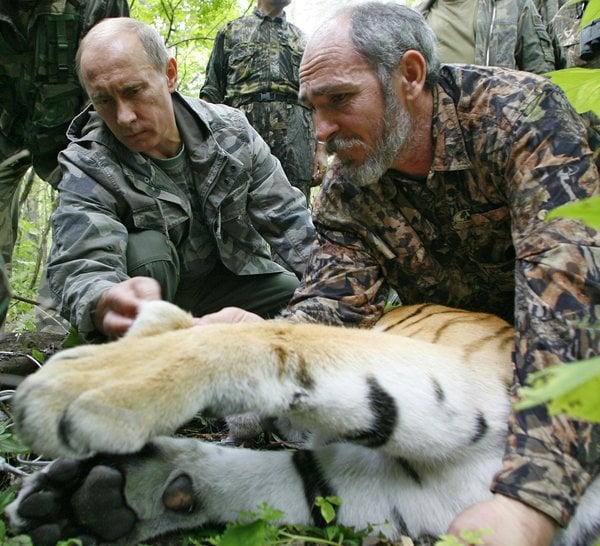This opinion was published by MASHA GESSEN in The New York Times on SEPTEMBER 16, 2012.
Secretly I had felt that I had made Vladimir Putin up. I had spent years studying his interviews, his speeches and his ad-libbed statements, and he had come out flat and gray. Some people claimed he had a secret dimension, others said he possessed charm – I saw no evidence of it. But then, I had never talked to the man: As a journalist, I had apparently been blacklisted by the Kremlin at the very beginning of his reign – I could not even get accredited to a press conference.
And then, last week, I shouted at him. I had been fired from my job as editor of Vokrug Sveta, a venerable popular-science magazine, for refusing to send a reporter to cover Putin’s hang-glider flight with endangered Siberian cranes. The following morning I felt hung-over and slightly disoriented.

ALEXEY DRUZHININ / AGENCE FRANCE-PRESSE — GETTY IMAGES
My phone rang and a male voice asked me to hold. I listened to silence for two minutes and fumed. A different male voice came on: ”Don’t hang up. I will connect you.” I blew up: ”I didn’t ask to be connected with anyone! Why do I have to hold? Who are you connecting me to? Do you want to introduce yourself?”
”Putin, Vladimir Vladimirovich,” said the president’s voice on the other end of the line.
”I heard you were fired,” he continued, while I scrambled to formulate a message for him that would also acknowledge that this might be a prank. ”And that I unwittingly served as the reason for it. But you should know that my nature-preservation efforts have nothing to do with politics. Unfortunately, for a person in my position it is difficult to separate the two.”
This turn of phrase was vintage Putin: asking for sympathy while subtly denigrating the office of president. ”So if you have no objections, I propose we meet and talk about this,” he said.
”I have no objections. But how do I know this is not a prank?” Putin promised I’d get a call arranging the meeting.
A week later I was waiting for Putin in the Kremlin. He is always late for meetings – wait times of four hours are average, and six or more hours are not unheard of. I had brought a book to read. I had wanted to bring my own book, the unauthorized Putin biography, but my friends and family begged me not to.
I was reading Peter Matthiessen’s brilliant book about cranes, ”The Birds of Heaven: Travels with Cranes.” In the introduction, Matthiessen quotes a Long Island neighbor asking him, ”Who cares about cranes?” He explains: ”Like many people on many continents, I care profoundly about cranes and tigers, not only as magnificent and stirring creatures but as heralds and symbols of all that is being lost.”
My issue with Putin’s apparent interest in cranes and tigers – and also polar bears and snow leopards – is that he appears interested in them as symbols of his own power: He chooses the largest predators and the largest flying birds to dominate on camera, to show he is not only president but also king of the jungle.
Aside from his personal interest in projects aimed at saving Siberian cranes, tigers and snow leopards, Russia under Putin’s rule has turned disregard for the environment into state policy. Among other things, Putin personally sanctioned restarting the paper mill that has been polluting Baikal, the world’s oldest and deepest fresh-water lake: the president toured it in a minisubmarine and said it seemed clean enough to him.
”I like kitties and puppies and little animals,” Putin informed me at the start of our conversation, to which my former employer, the owner of Vokrug Sveta Publishing, had also been summoned. He said he felt his public efforts on behalf of endangered species helped draw attention to important problems. ”And I came up with the Siberian cranes project myself.”
This was news to me. The project to restore the Siberian crane population dates back to the late 1970s, when Putin was a young member of the K.G.B. Putin explained that he had heard of the program several years ago and learned that it had lost funding – so it had been his idea to finance the project again.
”So,” said Putin, addressing me, ”I am sure you will tell us your reasons for refusing to send a reporter, but you were wrong. And you,” he said, addressing my former boss, ”were also wrong to open fire like that. Sure, there should be discipline at a magazine, just as there should be in the army.”
Now was apparently my chance to deliver my message. ”Vladimir Vladimirovich, I agree with everything you said about the importance of drawing attention to these issues, and about the potential the head of state has of influencing nature-preservation programs,” I said. ”But, unfortunately, the way things work in this country is that as soon as you get involved, your person becomes more important than the cause. You are probably aware that when you put a satellite collar on that Siberian tiger, the tiger had actually been borrowed from the Khabarovsk zoo. And when you put a collar on the polar bear, that bear had been captured days ahead of time and kept under heavy sedation until you arrived …”
”Of course, there are excesses!” Putin interrupted me cheerily. ”And I have taken people to task for that. But it is so much more important that I draw attention to the issues! Sure, the leopard had been sedated,” he said (I’d said nothing about a leopard). ”But what’s important is that I was the one who came up with the whole leopards project! And the tigers. After I did that, 20 other countries that have tigers also started working on the problem. Sure, there are excesses,” he repeated. ”Like that time I dove for the amphorae.”
I could not believe he was the one drawing the analogy to the amphora fiasco. About a year ago, Putin posed for the cameras emerging from the bottom of the Black Sea bearing two ancient amphorae – which, it soon emerged, had been planted there for him to find.
”So then everyone started writing that the amphorae had been planted. Of course they were planted! I wasn’t diving to be able to blow my gills wide,” by which, I think, he meant some sort of sea-creature equivalent of self-aggrandizement. ”I was diving to draw attention to the history of that place. And then everyone started writing that I’d come up with planted amphorae like a moron. But some people actually started reading up on history.”
He turned to my publisher again and demanded to know if he was willing to offer me my job back. The publisher said yes.
”But one more thing,” I said, when Putin turned back to me. ”You said a magazine should be run like an army. It should not.”
”Depends on the army,” Putin winked. He likes winking.
”No, it does not. A magazine should not be like any army.” I was about to cite Russia’s Law on Mass Media, which explicitly prohibits publishers from interfering in editorial policy, but Putin suddenly wiped his thin smile off his face and stood up.
”I’ve got enough experience with this,” he said coldly. ”We’ll discuss this issue another time.”
The meeting had lasted 20 minutes. What had I learned? That the person I had described in my book – shallow, self-involved, not terribly perceptive, and apparently very poorly informed – is indeed the person running Russia, to the extent that Russia is being run.
Difficult as it was to believe, it seemed he had not been warned that I had written a highly critical book about him, which has been published to much publicity just about everywhere in the world except Russia. It seemed that Putin, who gets most of his information from television channels he dominates, had been unwittingly set up to offer a job to one of his most vocal critics. Sure, I had held the job before – but if I accepted it now, I would be doing it as a Kremlin appointee. Which is precisely why I had to say no.





